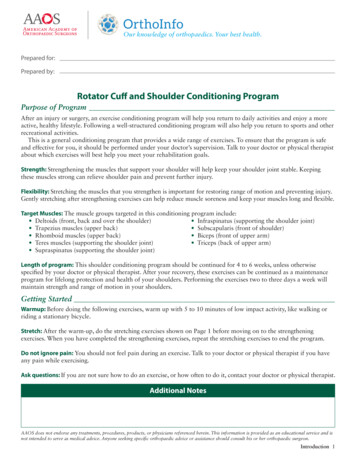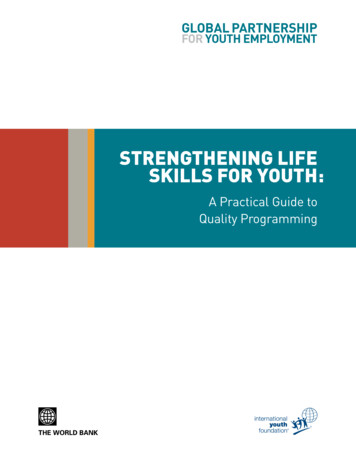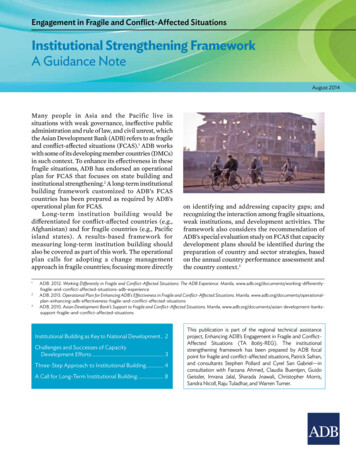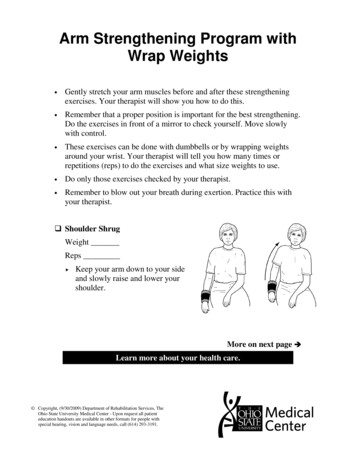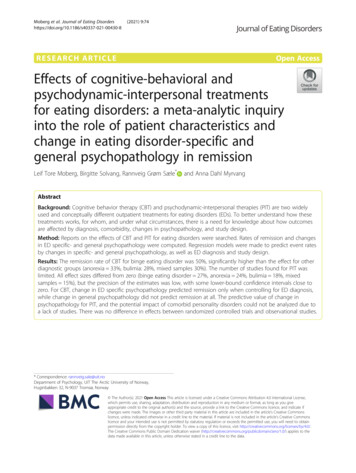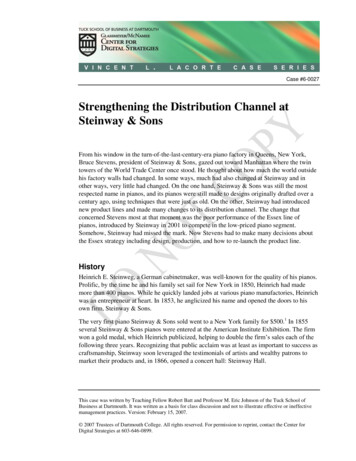
Transcription
36612.000 COVER.qxd 04-27-2006 2:47 PM Page aSTRENGTHENINGTHE FAMILYRESOURCE GUIDEFOR PARENTS
36612.000 COVER.qxd 04-27-2006 2:47 PM Page b
36612 000 BODY.qxd 03-08-2007 14:40 Page iSTRENGTHENINGTHE FAMILYRESOURCE GUIDE FOR PARENTSPublished byThe Church of Jesus Christ of Latter-day SaintsSalt Lake City, Utah
36612 000 BODY.qxd 03-08-2007 14:40 Page ii“PRAY IN YOUR FAMILIES UNTO THE FATHER,ALWAYS IN MY NAME,THAT YOUR [FAMILIES] MAY BE BLESSED.”3 NEPHI 18:21
36612 000 BODY.qxd 03-08-2007 14:40 Page iiiCONTENTS“The Family: A Proclamation to the World” .ivIntroduction .v1. Parenting Principles and Practices .12. Understanding Child Development .53. Communicating with Love .94. Nurturing Children .155. Fostering Confidence.196. Overcoming Anger .237. Resolving Conflict.278. Teaching Responsible Behavior .339. Applying Consequences .37PHOTOGRAPHY CREDITSExcept as noted below, all photography is by Robert Casey. Robert Casey. Do not copy.Page xiii: Christina Smith.Page 4 (top), 6: Superstock. Do not copy.Page 10 (top): Matt Reier.Page 18 (top): Steve Bunderson. 2001 Steve Bunderson. Do not copy.Page 18 (bottom): Dynamic Graphics, Inc. 2006 by Intellectual Reserve, Inc. All rights reserved. Printed in the United States of America. English approval: 8/02
36612 000 BODY.qxd 03-08-2007 14:40 Page ivTHE FAMILYTHE FIRST PRESIDENCY AND COUNCIL OF THE TWELVE APOSTLESOF THE CHURCH OF JESUS CHRIST OF LATTER-DAY SAINTSWE, THE FIRST PRESIDENCY and the Council of theTwelve Apostles of The Church of Jesus Christ of Latterday Saints, solemnly proclaim that marriage between aman and a woman is ordained of God and that thefamily is central to the Creator’s plan for the eternaldestiny of His children.ALL HUMAN BEINGS—male and female—are created in theimage of God. Each is a beloved spirit son or daughter ofheavenly parents, and, as such, each has a divine natureand destiny. Gender is an essential characteristic of individual premortal, mortal, and eternal identity and purpose.IN THE PREMORTAL REALM, spirit sons and daughters knewand worshiped God as their Eternal Father and acceptedHis plan by which His children could obtain a physicalbody and gain earthly experience to progress toward perfection and ultimately realize his or her divine destiny asan heir of eternal life. The divine plan of happiness enablesfamily relationships to be perpetuated beyond the grave.Sacred ordinances and covenants available in holytemples make it possible for individuals to return to thepresence of God and for families to be united eternally.THE FIRST COMMANDMENT that God gave to Adam andEve pertained to their potential for parenthood as husband and wife. We declare that God’s commandment forHis children to multiply and replenish the earth remainsin force. We further declare that God has commandedthat the sacred powers of procreation are to be employed only between man and woman, lawfully weddedas husband and wife.WE DECLARE the means by which mortal life is created tobe divinely appointed. We affirm the sanctity of life and ofits importance in God’s eternal plan.HUSBAND AND WIFE have a solemn responsibility to loveand care for each other and for their children. “Childrenare an heritage of the Lord” (Psalms 127:3). Parents have asacred duty to rear their children in love and righteousness, to provide for their physical and spiritual needs, toteach them to love and serve one another, to observe thecommandments of God and to be law-abiding citizenswherever they live. Husbands and wives—mothers andfathers—will be held accountable before God for the discharge of these obligations.THE FAMILY is ordained of God. Marriage between manand woman is essential to His eternal plan. Children areentitled to birth within the bonds of matrimony, and to bereared by a father and a mother who honor marital vowswith complete fidelity. Happiness in family life is most likelyto be achieved when founded upon the teachings of theLord Jesus Christ. Successful marriages and families areestablished and maintained on principles of faith, prayer,repentance, forgiveness, respect, love, compassion, work,and wholesome recreational activities. By divine design,fathers are to preside over their families in love and righteousness and are responsible to provide the necessities oflife and protection for their families. Mothers are primarilyresponsible for the nurture of their children. In thesesacred responsibilities, fathers and mothers are obligatedto help one another as equal partners. Disability, death, orother circumstances may necessitate individual adaptation. Extended families should lend support when needed.WE WARNthat individuals who violate covenants ofchastity, who abuse spouse or offspring, or who fail tofulfill family responsibilities will one day stand accountable before God. Further, we warn that the disintegrationof the family will bring upon individuals, communities,and nations the calamities foretold by ancient andmodern prophets.WECALL UPON responsible citizens and officers ofgovernment everywhere to promote those measuresdesigned to maintain and strengthen the family as thefundamental unit of society.This proclamation was read by President Gordon B. Hinckley as part of his message at theGeneral Relief Society Meeting held September 23, 1995, in Salt Lake City, Utah.
36612 000 BODY.qxd 03-08-2007 14:40 Page vINTRODUCTIONTHE PURPOSE OF THIS GUIDELoving, effective parents are needed to guard against societal influences that aredestructive to the family. President Gordon B. Hinckley declared: “Perhaps our greatest concern is with families. The family is falling apart all over the world. The oldties that bound together father and mother and children are breaking everywhere.We must face this in our own midst. There are too many broken homes among ourown. The love that led to marriage somehow evaporates, and hatred fills its place.Hearts are broken; children weep.”1This guide is a resource for you as you participate in the Strengthening the Familycourse developed by LDS Family Services. The purpose of the course is to fosterharmonious and loving family relationships. Sessions are conducted like otherChurch classes—gospel principles provide the foundation and framework for thesessions. In addition, learning activities and professional insights will help you integrate principles and skills in your life.PARTICIPATING IN THE COURSEThis guide presents nine subjects that can help you strengthen your family. Thecourse instructor will choose which subjects to emphasize, based on the needs andinterests of course participants. Some topics may require more than one session. Atypical course will include 9 to 12 sessions.Read this guide carefully, and complete the learning activities in each session. Putyour whole heart into learning the material and developing your skills. You willderive the greatest benefit from the course as you contribute in the class and applythe doctrines and principles you learn.Contributing to the ClassThe course will be most meaningful for you as you participate actively. You canparticipate by preparing well for sessions and by joining class discussions andskill-building activities. As you participate, you will learn from other class members,and you in turn will help teach them. Do your best to invite the influence of the HolyGhost. Make sure that all your communications are edifying. Please follow theserules as you participate in the class: Confidentiality. Information shared in the class remains in the class. Brevity. Your comments should be brief so others can also participate.v
36612 000 BODY.qxd 03-08-2007 14:40 Page viINTRODUCTION Balance. You may speak as often as time allows as long as you give othergroup members an equal opportunity. Patience and kindness. As you learn and integrate new skills, be patient andkind to your spouse, your children, and yourself. Encouragement. Encourage other participants in the class, and encourageyour spouse as you work together to strengthen your family. Forgiveness. Everyone makes mistakes, even after being taught new ways ofdoing things. Learn to forgive yourself and others.You are invited to share your experiences in class, but you should not bring upsensitive personal matters that require individualized ecclesiastical or professionalassistance. Be careful not to embarrass your spouse, children, or others. If you needindividual help, consult with your bishop or branch president. You may also call LDSFamily Services for a referral to a professional counselor.Applying Doctrines and PrinciplesYou will progress as you apply the principles you learn in this course. PresidentHarold B. Lee observed, “We never really know anything of the teachings of the gospeluntil we have experienced the blessings that come from living each principle.”2The more you practice new skills, the better you will be at applying them whenappropriate situations arise. Continually seek to increase your understanding ofgospel doctrines and principles about parenting children. The Lord will bless you inthis righteous endeavor.PROMISES TO PARENTSAs you learn the parenting principles and skills in this document, keep in mind thepromises to families who hold regular family home evenings, family prayer, andscripture study.Family Home EveningWhen introducing the weekly home evening program in 1915, the First Presidencyof the Church promised: “If the Saints obey this counsel, we promise that great blessings will result. Love at home and obedience to parents will increase. Faith will bedeveloped in the hearts of the youth of Israel, and they will gain power to combatthe evil influences and temptations which beset them.”3Family PrayerAbout the scriptural instruction from the Lord regarding family prayer, PresidentJames E. Faust of the First Presidency observed: “‘Pray in your families unto theFather, always in my name, that your wives and your children may be blessed’(3 Nephi 18:21). In our day, the Church urges us to have family prayer every nightand every morning. . . . Miraculous things happen when families pray together.”4President Gordon B. Hinckley taught the importance of family prayer: “I know ofnothing that will ease family tensions, that in a subtle way will bring about therespect for parents which leads to obedience, that will affect the spirit of repentancewhich will largely erase the blight of broken homes, than will praying together,confessing weaknesses together before the Lord, and invoking the blessings of theLord upon the home and those who dwell there.”5vi
36612 000 BODY.qxd 03-08-2007 14:40 Page viiINTRODUCTIONFamily Scripture StudyPresident Marion G. Romney of the First Presidency taught that great strengthand blessings will come to those families that study the scriptures together: “I ampersuaded by my own experience and that of my loved ones, as well as by the statements of the Prophet Joseph Smith, that one can get and keep closer to the Lord byreading the Book of Mormon than by reading any other book. Don’t be contentwith what someone else tells you about what is in it. Drink deeply from the divinefountain itself.“I feel certain that if, in our homes, parents will read from the Book of Mormonprayerfully and regularly, both by themselves and with their children, the spirit ofthat great book will come to permeate our homes and all who dwell therein. Thespirit of reverence will increase; mutual respect and consideration for each other willgrow. The spirit of contention will depart. Parents will counsel their children ingreater love and wisdom. Children will be more responsive and submissive to thecounsel of their parents. Righteousness will increase. Faith, hope, and charity—thepure love of Christ—will abound in our homes and lives, bringing in their wakepeace, joy, and happiness.”6NOTES1. In Conference Report, Oct. 1997, 94; or Ensign, Nov. 1997, 69.2. Stand Ye in Holy Places (Salt Lake City: Deseret Book, 1974), 215.3. “Editors’ Table: Home Evening,” Improvement Era, June 1915, 734.4. In Conference Report, Apr. 2002, 69; or Ensign, May 2002, 60–61.5. In Conference Report, Apr. 1963, 128; or Improvement Era, June 1963, 531.6. In Conference Report, Apr. 1980, 90; or Ensign, May 1980, 67.vii
36612 000 BODY.qxd 03-08-2007 14:40 Page viii“PARENTS HAVE A SACRED DUTY TO REAR THEIRCHILDREN IN LOVE AND RIGHTEOUSNESS, . . .TO TEACH THEM TO LOVE AND SERVE ONE ANOTHER.”“ T H E FA M I LY: A P R O C L A M AT I O N TO T H E W O R L D ”
36612 000 BODY.qxd 03-08-2007 14:40 Page 1SESSIONONEPARENTINGPRINCIPLESAND PRACTICESThe need for loving, effective parents has never been greater. President Gordon B.Hinckley observed that families are “falling apart all over the world. The old ties thatbound together father and mother and children are breaking everywhere. . . . Heartsare broken; children weep.”1What challenges do you have in rearing your children?How can you help your children become responsible, law-abiding individuals whowill fulfill their divine potential?GUARDING AGAINST FAMILY BREAKDOWNMany children experience problems that stem from family breakdown, includingdepression, anxiety, rebellion, academic failure, social withdrawal, addiction to pornography, immorality, and drug abuse. The Apostle Paul warned that in the last daysmany will be “disobedient to parents, unthankful, unholy, without natural affection,. . . lovers of pleasures more than lovers of God” (2 Timothy 3:2–4).President Hinckley stressed the urgent need for effective parenting to address suchchallenges: “My plea—and I wish I were more eloquent in voicing it—is a plea to savethe children. Too many of them walk with pain and fear, in loneliness and despair.Children need sunlight. They need happiness. They need love and nurture. They needkindness and refreshment and affection. Every home, regardless of the cost of the house,can provide an environment of love which will be an environment of salvation.”2Attitudes about ParentingSocietal attitudes about parenting often influence the way mothers and fathers treattheir children. Many parents are influenced by views that children are (1) innatelyevil and require harsh punishment and correction; (2) innately good and will achievetheir greatest potential if left to themselves; (3) like a blank slate and can be made intoany kind of person the parents want;3 other parents view children as (4) molded bybiological factors; (5) able to interpret their environment, shape their own behavior,and alter or abandon parental values. While most of these views contain some truth,any of them taken to an extreme can misguide parents and harm children.The Light of Gospel TruthThrough revelation, Latter-day Saints know the divine nature of mankind and themanner in which parents are to rear their children. The First Presidency and Quorumof the Twelve Apostles declared: “All human beings—male and female—are created inthe image of God. Each is a beloved spirit son or daughter of heavenly parents, and,1
36612 000 BODY.qxd 03-08-2007 14:40 Page 2PA R E N T I N G P R I N C I P L E S A N D P R A C T I C E Sas such, each has a divine nature and destiny.” They also taught: “‘Children are anheritage of the Lord’ (Psalms 127:3). Parents have a sacred duty to rear their childrenin love and righteousness, to provide for their physical and spiritual needs, to teachthem to love and serve one another, to observe the commandments of God and to belaw-abiding citizens. . . . Husbands and wives—mothers and fathers—will be held accountable before God for the discharge of these obligations.”4While environmental and biological factors may influence child development,each child of God has agency. Elder Neal A. Maxwell of the Quorum of the Twelveobserved: “Of course our genes, circumstances, and environments matter very much,and they shape us significantly. Yet there remains an inner zone in which we aresovereign unless we abdicate. In this zone lies the essence of our individuality and ourpersonal accountability.”5Differences in children may require a variety of responses in parents, so parents mustbe wise in how they respond to their children. President Brigham Young encouragedparents to “study their [children’s] dispositions and their temperaments, and dealwith them accordingly.”6THE AUTHORITATIVE APPROACH TO PARENTINGThe First Presidency and the Quorum of the Twelve gave nine divinely inspired principles to guide fathers and mothers in their parenting responsibilities: “Successfulmarriages and families are established and maintained on principles of faith, prayer,repentance, forgiveness, respect, love, compassion, work, and wholesome recreational activities.”7 These principles provide a foundation for parental influence thatwill help children return to live with Heavenly Father.The greatest of these principles is love (see Matthew 22:36–40). The single mostimportant thing you can do for your children is to love them in a Christlike manner.When your children feel and know of your love, they are more likely to listen to yourteachings, follow your example, and accept discipline from you. Love should motivateand guide all your involvement with them. Listening without love will be perceivedas disinterest. Discipline without love will be looked upon as unrighteous dominion.Teaching without love may fall on deaf ears. Family life without love will starve thespirits of children and lead to unhappiness and relationship problems.The parenting principles taught in this course are consistent with the scripturesand closely resemble those of a parenting style called authoritative. This style differsgreatly from approaches that are authoritarian (controlling, dictatorial, lacking inwarmth and love) or permissive (little or no control, little guidance and teaching).Authoritative parents have high expectations for their children, and they also showa high degree of warmth and responsiveness. They are loving and supportive. As theyguide their children, they generally “encourage verbal give and take and share withtheir children the reasoning behind their policies. . . . They exert firm control at pointsof parent–child divergence but do not hem their children in with restrictions. . . .[They] guide their children’s activities . . . and require them to . . . [help] with household tasks. They willingly confront their children in order to obtain conformity, statetheir values clearly, and expect their children to respect their norms.” Children raisedin this manner are more likely to be socially confident, friendly, self-disciplined,cooperative, and achievement oriented.82
36612 000 BODY.qxd 03-08-2007 14:40 Page 3PA R E N T I N G P R I N C I P L E S A N D P R A C T I C E STHE POWER OF COVENANTSYou are not alone in your efforts to save your children. Heavenly Father has providedsacred covenants by which His children can receive blessings. When you enter thecovenant of eternal marriage and abide by its terms, Heavenly Father promises youeternal life (see D&C 132:20). Brigham Young taught that children who are born inthe marriage covenant become “legal heirs to the Kingdom and to all its blessings andpromises.”9 Joseph Smith, Brigham Young, and Joseph Fielding Smith all taught thatadded blessings come to children whose parents are sealed in the temple marriagecovenant. These blessings help children return to Heavenly Father, where they remaineternally bound to their righteous parents.10MEASURING PARENTING SUCCESSSome parents look for indicators of how well they are doing as parents. PresidentHoward W. Hunter gave this direction: “A successful parent is one who has loved, onewho has sacrificed, and one who has cared for, taught, and ministered to the needsof a child. If you have done all of these and your child is still wayward or troublesome or worldly, it could well be that you are, nevertheless, a successful parent.Perhaps there are children who have come into the world that would challenge anyset of parents under any set of circumstances. Likewise, perhaps there are others whowould bless the lives of, and be a joy to, almost any father or mother.”11PRACTICEReview the nine parenting principles from the family proclamation, and identify onethat you can work on to strengthen your family. Set goals that are identifiable andmeasurable. Once you have successfully implemented your plan, choose anotherprinciple to work on.ADDITIONAL STUDYStudy the following, and consider how they apply to your family.“The Family: A Proclamation to the World”D&C 121:41–44NOTES1. In Conference Report, Oct. 1997, 94; or Ensign, Nov. 1997, 69.2. In Conference Report, Oct. 1994, 74–75; or Ensign, Nov. 1994, 54.3. See Craig Hart and others, “Proclamation-Based Principles of Parenting and Supportive Scholarship,”in Strengthening Our Families: An In-Depth Look at the Proclamation on the Family, ed. David C. Dollahite (Salt Lake City: Bookcraft, 2000), 101–3.4. “The Family: A Proclamation to the World,” Ensign, Nov. 1995, 102.5. In Conference Report, Oct. 1996, 26; or Ensign, Nov. 1996, 21.6. Discourses of Brigham Young, sel. John A. Widtsoe (Salt Lake City: Deseret Book, 1954), 207.7. “The Family: A Proclamation,” Ensign, Nov. 1995, 102.8. Diana Baumrind, “Rearing Competent Children,” in Child Development Today and Tomorrow, ed.William Damon (San Francisco: Jossey-Bass Publishers, 1989), 351–54; quotations from 353–54.9. Discourses of Brigham Young, 195.10. See Conference Report, Apr. 1929, 110; Discourses of Brigham Young, 208; Doctrines of Salvation,comp. Bruce R. McConkie, 3 vols. (Salt Lake City: Publishers Press, 1954–56), 2:90.11. In Conference Report, Oct. 1983, 94; or Ensign, Nov. 1983, 65.3
36612 000 BODY.qxd 03-08-2007 14:40 Page 4GRADUAL PROGRESS IS ESSENTIALTO HEALTHY CHILDHOOD DEVELOPMENT.AS A PARENT, YOU CAN HELP BY PROVIDINGA SECURE, NURTURING ENVIRONMENT.
36612 000 BODY.qxd 03-08-2007 14:40 Page 5SESSIONTWOUNDERSTANDINGCHILD DEVELOPMENTSome children develop problems because their parents have inappropriate and unreasonable expectations of them. Elder Neal A. Maxwell of the Quorum of Twelve declaredthat “a tutoring God may require difficult things of His children” but He “wouldnever command His children to do difficult things, except [He] first prepares the way(see 1 Nephi 3:7).”1 Heavenly Father does not expect impossible things from Hischildren; mortal parents should not expect the impossible from them either.Is it possible that you expect too much or too little of your children?What developmental information might help you rear your children successfully?PACED PROGRESSScriptures suggest an orderly progression in life, including physical and spiritualdevelopment. John bore record that Jesus Christ “received not of the fulness at first,but continued from grace to grace, until he received a fulness” (D&C 93:13). Gradual progress is essential to healthy child development. As a parent, you can help byproviding a secure, nurturing environment in which your children can learn andprogress.Readiness is a key concept to keep in mind as your children grow and develop.You will prevent many problems if you allow them to acquire skills at their ownpace. Try to adapt to each child’s needs rather than to make the child adjust toyour expectations.DEVELOPMENTAL STAGESSocial-emotional development may be seen as a series of stages that occur aroundcertain ages. You will be more effective if you understand them. Do not be concernedif your children do not match these general descriptions exactly. Children haveunique personalities and develop at different rates.2Learning to Trust (Infancy)When you recognize and lovingly respond to your newborn baby’s cues forhunger and distress, your baby learns to trust you and develops confidence thatyou will respond to his or her needs in the future. Your baby will form an attachment to you and will feel secure in his or her environment. Your love for the childwill also grow.When parents fail to respond to a child’s needs, the child feels insecure and anxious and has difficulty learning to trust others.5
36612 000 BODY.qxd 03-08-2007 14:40 Page 6U N D E R S TA N D I N G C H I L D D E V E L O P M E N TDeveloping Independence (Ages 1 to 3)The term “terrible twos” is often used to characterize the vigorous exertions of children to be independent. (Independent behavior often does not begin until about agetwo.) At this time children begin to learn self-control, including bowel and bladderfunctioning, and how to cope with the world. In this stage, children learn to run,feed themselves, drink from a cup, pull toys, open doors, climb on furniture, andwash and dry hands. By age two, they are often quite rigid and demanding and havedifficulty adapting or waiting for what they want. Most go through this stage nomatter how they are raised.You can help by being patient, by allowing your child to act independently withinacceptable limits, and by giving choices (see session 8) as a way of preventing powerstruggles. Recognize that the phase is temporary but significant for your child. Withhelp and understanding, your child can gain a sense of self-control that can lead to alasting sense of self-respect and good will.Organize your house so children can run and explore without hurting themselvesor damaging anything. Enjoy them, spend time with them, teach them how to playwith others, and read to them at bedtime. Be firm but loving when disciplining them.Saying “no” should not require an explanation. “Because I said so” is usually sufficientfor children at this stage.These early formative years are an ideal time to begin spiritual instruction becausechildren are eager to learn.Channeling Initiative (Ages 3 to 6)During these years, children have a surplus of energy and try to learn and mastertasks that will bring a sense of competence and connection to their world. Childhoodfantasies are often exaggerated, involving themes of power and aggression, and mayresult in the child feeling bad. When positive outlets are unavailable, the child mayfeel powerless, unhappy, and anxious.By age four, most children can hop, stand on one foot, ride a tricycle, kick a ball,and go up and down stairs unassisted. They begin to play cooperatively, ask many6
36612 000 BODY.qxd 03-08-2007 14:40 Page 7U N D E R S TA N D I N G C H I L D D E V E L O P M E N Tquestions, and engage in fantasy play. They sometimes break rules and defy parentsbut are often surprisingly responsive when given latitude.By age six, most can ride a bike, tie their shoes, bounce and bat a ball, and countto 100. Many are emotional at this age, expressing variations of love and resentment.They tend to take center stage but lack a secure sense of who they are. They like toget their way. They can be rude and argumentative when told to do something.You can help by being patient and loving, using firmness while allowing children totest themselves within clearly defined boundaries. Set up rules to provide structure forwatching television, doing chores, completing homework, and going to bed.Use choices and consequences for behavior problems. Spend time with children,read to them, and take an interest in their activities at home and school. Arrange timefor them to explore, run outdoors, and play with others.Learning to Be Industrious (Ages 6 to 12)This stage begins when the child enters school and continues to the onset of puberty.The child feels pleasure and develops confidence through learning, getting good grades,and developing skills. The child enters the social culture and feels acceptable and productive when able to compare favorably with others. When the child does not comparefavorably, he or she often feels inferior. The outcome of this phase is significant. Thosewho become industrious often greet life’s challenges with optimism. Those who do notbecome industrious sometimes withdraw into self-defeating behavior patterns.By age eight, children have a basic sense of right and wrong. They can usuallywrite, and they often have a sense of humor. They are usually very active and socialand have a best friend. They want to “take on the world.”By age 10, preadolescence begins. These children tend to be calm, compliant, andeasy to get along with. They are often social, cooperative, and industrious and helpful at home. They value their parents and the opinions of their friends. They enjoygroup activities at church and school. By age 12, many girls begin puberty. Overall,these children get along well at home and school, but many experience emotional andbehavioral roller coasters, bouncing from childhood to adolescence and back again,being responsible and irresponsible, testing rules and depending on them. Appearancebecomes important. Friendships may change abruptly.You can help your children foster an interest in achievement when you take aninterest in their activities and give recognition for jobs well done. Join with them inprojects and activities,
repentance, forgiveness, respect, love, compassion, work, and wholesome recreational activities. By divine design, fathers are to preside over their families in love and righ-teousness and are responsible to provide the necessities of life and protection for their families. Mothers are primar

